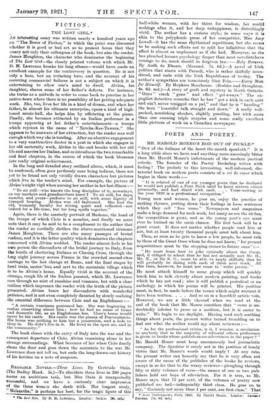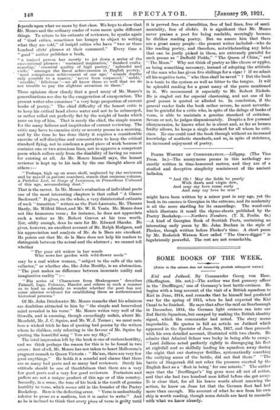POETS AND POETRY.
MR. HAROLD MONRO'S ROD OUT OF PICKLE.* " OUT of the fullness of the heart the mouth speaketh." It is a long while since we have read anything more amusingly bitter than Mr. Harold Monro's indictments of the modern poetical coterie. The founder of the Poetry Bookshop writes with feeling ! The prelude to this interesting, well-informed, dic-
tatorial book on modern poets consists of a cri de coeur which begins in these words :— " It is related of one of our younger poets that he declared he would not publish a First Book until he knew sixteen critics personally, and had dined with each. . . . Verse-writing in the year 1920 is a professional occupation."
Young men and women, he goes on, enjoy the practice of making rhymes, putting down their feelings in loose sentences which they call " free verse." Newspapers and magazines make a large demand for such work, but many as are the niches, the competition is great, and so the young poet's eye must ever be trained on the main chance. His first book will be a
great event. It does not matter whether people read him or not, but at least twenty thousand people must talk about him.
Then, as soon as he gets to know a few people, he must talk to them of the Great Ones whom he does not know, " for present acquaintance must be the stepping-stones to future ones " :—
" He must learn how to joke cynically about the Great, and, if obliged to admit that he has not actually met Mr. H., Mr. N., or Sir S. G., must be able to imply skilfully that he will probably be dining with each of them next week. All this time, however, he must not cease to write poetry.' " He must attach himself to some group which will quickly teach him to talk cleverly about modern painting, and books which he has not read ; also it will publish a periodical or an anthology in which his poems will be printed. His position must, in fact, be made before the verses which might warrant it have been written. . . . And so on in a heartfelt satiric vein. However, we are a little cheered when we read at the end of the book that Mr. Monro considers that " verse is un- doubtedly inferior to prose as a medium, but it is easier to write." We begin to see daylight. Having read such scathing
things about poets, the present writer turned trembling on to find out what the author would say about reviewers :-
" As for the professional critics, is it, I wonder, a revelation to anybody that in the majority of editorial offices preference is given to books whose publishers are advertisers in the paper ? "
Mr. Harold Monro must keep uncommonly bad journalistic company. The Spectator is surely not in the position of lonely virtue that Mr. Monro's words would imply Y At any rate, the present writer can honestly say that he is very often not aware of the name of the publisher of the books he reviews, except in so far that to the weary reviewer—ploughing through fifty or sixty volumes of verse—the names of one or two pub- lishers hold out hope of alleviation. For it is true, as Mr. Monro says, that 75 per cent. of the volumes of poetry now published are bad—indisputably third class. He goes on to Bay, " Certainly not more than 1 per cent. are first class." That • Some Contemporary Pods, 1920. By Harold Monro. London: Leonard Pandas. [7e. ed. not.)
iepends upon what we mean by first class. We hope to show that fir. Monro and the ordinary reader of verse mean quite different things. To return to his estimate of reviewers, he speaks again of " tired critics, sometimes too hungry to object to writing what they aro told," of insipid critics who have " two or three
hundred clicld phrases at their command." Every time a " good " author publishes a book, " a trained person has merely to jot down a series of the conventional phrases : sustained inspiration,' finished crafts- manship,' essential quality of high poetry,' splendid and virile,' amongst the finest achievements in English poetry,' ' most conspicuous achiovement of our ago,' sounds depths only possible to a master,' never been surpassed,' noble,'
notable," felicitous '—we all know them so well that we do not trouble to pay the slightest attention to them."
These opinions show clearly that a good many of Mr. Monro's generalizations are due to the exaggeration of exasperation. The
present writer also examines " a very large proportion of current books of poetry." The chief difficulty of the honest critic is to keep his critical head above water and not to be submerged, or rather rolled out perfectly flat by the weight of books which pour on top of him. That is surely the chief, the simple reason
for the many failures and ineptitudes of current reviewing. The critic may have to examine sixty or seventy poems in a morning, and by the time he has done thirty it requires a considerable exercise of self-discipline and concentration to keep the critical standard flying, not to condemn a good piece of work because it
contains one or two atrocious lines, not to approve a competent poem which suffers only from the disability of having no reason for existing at all. As Mr. Monro himself says, the honest reviewer is kept up to his task by the one thought above all others :-
"Perhaps, high up on some shelf, neglected by the reviewers and by myself (a patient searcher), stands that ominous volume, a Paradise Lost, or Son3s of Innocence, or Prometheus Unbound of this age, accumulating dust."
That is the carrot. In Mr. Monro's evaluation of individual poets one of the most interesting chapters is that called " A Glance
Backward." It gives, on the whole, a very disinterested estimate of such " transition " writers as the Poet-Laureate, Mr. Thomas Hardy, Mr. Wilfrid Blunt, and Mr. W. B. Yeats. Mr. Monro does not like humorous verse ; for instance, ho does not appreciate such a writer as Mr. Robert Graves at his true worth. Nor, oddly enough, does he care for Mr. Edward Shanks. He gives, however, an excellent account of Mr. Ralph Hodgson, and his appreciation and analysis of Mr. de In Mare are excellent. He points out that Mr. de la Mare does not help his readers to distinguish between the actual and the abstract ; we cannot tell whether
" The poor old widow in her weeds
Who sows her garden with wild-flower seeds "
may be a real widow woman, " subject to the calls of the rate collector," or whether she, like John Mouldy, is an abstraction.
" The poet makes no difference between incarnate reality and imaginative reality" :—
" His series of Characters from Shakespeare ' describes Falstaff, Iago, Polonius, Hamlet and others in such a manner as to lead us solemnly to wonder whether the poet has not some ulterior evidence for establishing them as authenticated historical persons."
Of Mr. John Drinkwatcr Mr. Monro remarks that his admirers are doubtless attracted to him by " the simple and benevolent mind revealed in his verse." Mr. Monro writes very well of the Sitwells, and is amusing, though exceedingly unfair, about Mr. Masefield, Mr. J. C. Squire, and Mr. W. J. Turner ; we must note here a wicked trick he has of quoting bad poems by the writers whom he dislikes, only relenting in the favour of Mr. Squire by quoting the beautiful song You are my Sky."
The total impression left by the book is one of curious hostility, and we think perhaps the reason for this is to be found in two errors : first of all, Mr. Monro has not taken to heart Melbourne's pregnant remark to Queen Victoria : " Ma'am, there are very few good an3rthinp." He holds it a scandal and shame that there are so many bad poets and so many bad reviewers. Surely his attitude should be one of thankfulness that there are a very few good poets and a very few good reviewers. Poetasters and puffers arc not a unique product of this age or of this country.
Secondly, in a sense, the tone of his book is the result of genuine hostility to verse, which seems odd in the founder of the Poetry Bookshop. Here is the deflecting error. " Verso is undoubtedly inferior to prose as a medium, but it is easier to write." And
no he is inclined to think that every piece of verse is guilty until it is proved free of absurdities, free of bad lines, free of senti• mentality, free of cliches. It is significant that Mr. Mauro never praises a poet for being readable, seemingly because, he dislikes reading poetry. But we assure him that there aro a great many people—the present writer included—who do like reading poetry, and therefore, notwithstanding any holes that can be justly picked in them, are extremely grateful for such poems as " Daffodil Fields," " The Queen of China," and "- The Moon." Why not think of poetry as like cheese or apples, as being something necessary, instead of adopting the attitude of the man who has given five shillings for a cigar ? If we admit all his negative tests, " who then shall be saved" ? But the book is a tonic to the system as well as bitter to the tongue. It will be splendid reading for a great many of the poets mentioned in it. We recommend it especially to Mr. Robert Nichols. He is singled out for especial chastening, and not one of his good poems is quoted or alluded to. In conclusion, if the general reader finds the book rather severe, he must neverthe- less be grateful for a critic who, in spite of the deluge of books of verse, is able to maintain a genuine standard of criticism. Severe or not, he judges dispassionately. Despite a few personal idiosyncrasies, ho knows what he is about and, as far as human frailty allows, he keeps a single standard for all whom he criti- cizes. No one could read the book through without an increased knowledge of aesthetic standards, and so, in spite of strictures, an increased enjoyment of poetry.



































 Previous page
Previous page